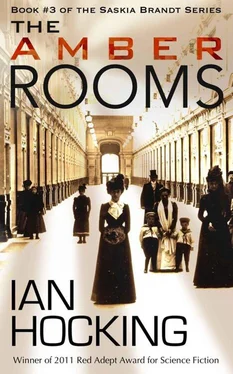They were conferring.
Saskia turned and walked towards the Kalashnikov Quay trolley car, which was approaching from the direction of the Admiralty. One glance confirmed that Gentleman and Clerk were following her. Saskia accepted the helping hand of an elderly gentleman at the rear of the tram. She thanked him and moved along the aisle. Through the smoked windows she saw Gentleman and Clerk separate. While Gentleman alighted the trolley car, Clerk jogged on towards the Alexander Theatre, where Saskia knew there to be a public telephone. These agents would know the location of all the public telephones in St Petersburg. Soon, he would spread the news of Saskia’s route to his confederates.
Saskia confirmed this ten minutes later when two more agents joined the trolley car on Konnaya Street while Gentleman stepped down. Both new agents were young men and costumed as students. They did not so much as glance in her direction, and this made them unusual among the male passengers in the car. For Saskia, this, together with the departure of Gentleman, marked them as the Tsar’s Own. The specimen on the left was built like a boxer; his colleague had a naturally sleepy expression. She lowered her chin and thought hard about their conversation. The sounds of the trolley car muted and their words became clear.
‘Who?’ said the one. ‘You mean Brockhaus? You overestimate her.’
‘He’s waiting, isn’t he?’ said the other. ‘She must be important, despite her sex.’
Saskia made a deliberate quarter turn and looked at the man, raising one eyebrow.
‘Oh, that face! I will marry her.’
‘She’s a bloody Bolshevik, Dmitri.’
‘Nobody’s perfect.’
Saskia stepped from the trolley car one stop before the quay. She was not surprised to see Brute Force and Ignorance leaving with her. There was a line of market stalls. Saskia moved towards them. Behind her, and beyond her followers, a trio of soldiers was approaching on horseback. Ahead, a class of schoolboys were laughing and pushing their way towards her. The schoolboys would intersect the soldiers near a fishmonger’s stall. Saskia walked between the barrels that marked the edges of the plot and asked the fishmonger for three tails of monkfish.
The fishmonger had one arm. He stacked the fish. He squinted against the smoke of his clay pipe and waved at a short woman behind him. She placed the fish on a scale. Saskia watched her every motion. She felt the nearness of Brute Force as though he were a draught.
The soldiers were close, too. She looked again at her memory of them. They were Chevalier Guards, and probably heading towards their barracks near the Alexander Bridge. These three were cuirassiers. They wore black boots, white britches and piped-red breastplates that shone.
And the schoolchildren. All boaters and garters.
Saskia paid for the monkfish and placed the package within her muff. The fishmonger’s wife blinked at this oddity, but said nothing and dug into her apron for the change. Saskia backed away with a perfunctory, ‘The rest is for tea,’ before the wife could give her the money. Saskia turned, stumbling as she did, and fell against the horse of the first Chevalier. In the moment, her left wrist slid from her muffler and gave the horse a sharp blow across its nostril.
The horse was not flighty; it recoiled with some grace. But its crossed sidesteps crushed the thigh of its rider against his colleague, who was immediately to his right, and the second man reacted with surprise. He wheeled his horse in a circle. Its shoulder struck Brute Force and pushed him into the crowd of schoolboys, who feigned outrage at the imposition, swatting him with their boaters. A boy shouted, ‘What’s all this! What’s all this!’ and his companions laughed.
Saskia replaced her wrist in the muff and met the eyes of the first rider. The bronze peak of his helmet made his stare imposing, but he asked mildly, ‘Are you injured, madam?’
Saskia smiled. Then, seeing that Brute Force had lost sight of her, she crossed the street, broke into a jog, and leapt onto the back-plate of the trolley car heading west, towards the Nikolaev Station, on the Nevsky Avenue. She saw a family of gypsies walking slowly behind a cart and shouted, ‘Hey, little paw!’ When the young girl looked up, Saskia tossed her the bundle of fish. She caught it with a delighted clap. Saskia shared a laugh with the receding face and turned back to the trolley car. Ignorance was sitting nearby, his legs crossed at the knee, and a copy of the St Petersburg gazette under one arm. He was applauding her silently.
Saskia scowled. She sat alongside him.
‘These trams are electric now,’ she said. ‘We can talk.’
‘What shall we talk about?’
He was immaculately shaved, but his nose had once been frostbitten, and there were inky dots of gunpowder embedded in his cheek. He was no older than twenty five.
‘That’s the irony. I have nothing to say. It does not bode well for any marriage, Dmitri.’
Ignorance lost his colour. He opened his mouth to speak. He said nothing. When the bell rang, Saskia said, not unkindly, ‘Nice try. If you do not mind, I will not applaud.’
She stepped from the trolley car. The man rose to follow her but he could not. His hand would not move from the metal armrest. He tugged once, twice, then examined the handcuffs as though baffled by their existence. He looked at the empty tube of his gazette, where they had been stored moments ago, and looked at Saskia. His expression of bewilderment did not change as the trolley car pulled away towards the admiralty.
Saskia took a breath and looked around. The smog was lifting.
In due course, Saskia presented herself at a fine two-storey building on the Moika Canal. Its exterior was remarkable even among these grand residencies. The Imperial flag stood at full mast against the clouds, which rolled overhead like the cracked floes of the Neva. Below it was a second flag: Tsar Ivan’s double-headed eagle. A flight of marble steps lined with statues led to the entrance.
She did not wait long for the footman to hurry down to the steps. He wore scarlet trousers, a gold-embroidered jacket, and a white turban. The costume echoed that of the Tsar’s Abyssinian guards.
‘I am Ms Tucholsky,’ she said with studied aloofness. She passed him a letter of introduction from her warmer. ‘I would be honoured to wait upon the Countess.’
~
Saskia sat with a straight back, her knees bent and her ankles crossed. She held her wrist inside the warmer. She was in a library on the second floor of the building. In reaching it, she had passed through chambers and halls that marked every caprice of Petersburg architectural fashion. In one drawing room, she had counted forty paintings of the eighteenth century French School. Another held glass cabinets of porcelain. As for rooms, there could not be fewer than fifty. Most were arranged enfilade, without hallways. Saskia liked to know her spaces, particularly confined ones. The library room, unconfined by any standard, overlooked the Moika. It had the air of a museum gallery and the collections to match.
She let her eyes move over the library’s grey, monochrome ceiling to the emerald-green wall hangings and birch panels. She was seated at the first of three distinct arrangements of chairs. A fire had been lit for her. Saskia took a deep breath and held it. Pine. She needed to see the Count directly. The pretence of her employment here—as a tutor for the Count’s sickly child, Pavel—was a constant discomfort. With luck, she would be on her way before any real test of her prowess as a tutor could be made.
The eastern door was opened and Countess Charlotte Nakhimov entered. Saskia stood.
Читать дальше












